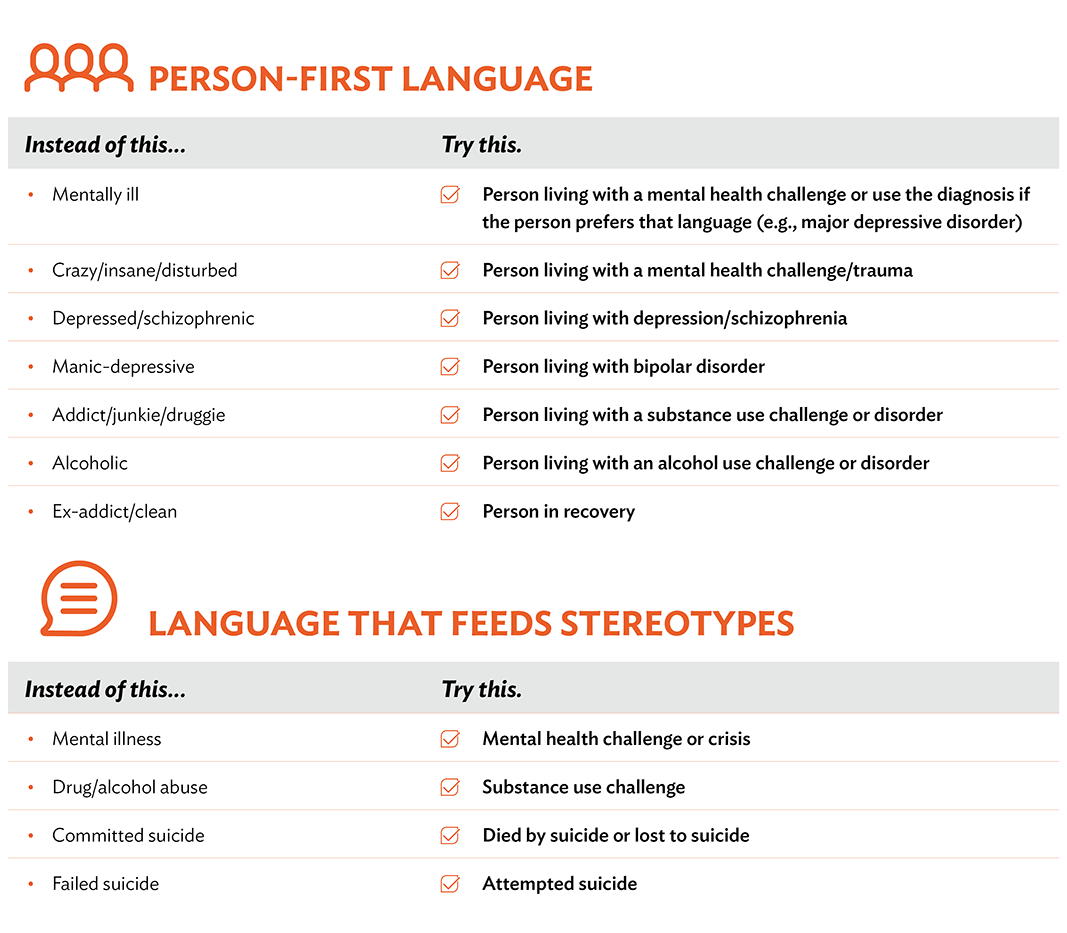Donate ![]()
![]()

For millennia, people living with mental health and substance use challenges were imprisoned, tortured and subjected to inhumane treatment. Our society has come a long way since then, however the stigmatization of these challenges is still a significant problem. Even subtle instances of stigma can do harm – think about how often television shows depict individuals living with things like schizophrenia or alcohol use disorder as dangerous villains. Mental Health First Aid (MHFA) describes stigma as negative attitudes (prejudice) and negative behaviors (discrimination). According to a recent report , over 50% of those with clinical level mental health risks do not seek help. In the U.S., 25% of those not seeking treatment report it is due to not wanting others to know. This is stigma in action, and it can lead to people feeling too ashamed to discuss their symptoms or seek treatment and act as a barrier to recovery. There is something you can do to change things. Language is powerful, and your choice of words can either break down misconceptions and stereotypes or feed into them. Stigmatizing language – such as “crazy” — perpetuates negative perceptions, which can result in people to be excluded from jobs, housing, social activities and relationships. Additionally, people may begin to believe the negative things that others say about them, delaying them on their recovery journey. Using person-first language puts the focus on the individual, not their disorder or diagnosis. Use this chart from MHFA to begin incorporating more inclusive, person-first language into your discussions about mental wellbeing. For more help on expanding your person-first vocabulary:
Studies show that better understanding of the experiences of people with mental health and substance use challenges can reduce or eliminate stigma and discrimination. Using person-first language is a great place to start, as it helps validate individuals’ experiences without reducing them to a diagnosis or condition. It also fosters greater understanding, dignity and respect for everyone, whether they are experiencing mental health challenges or not. Together, we can break down stigma and show every American that recovery is possible!
Get trained in Mental Health First Aid to learn how to have informed conversations about mental health and communicate in ways that will reduce sigma.
Centers for Disease Control and Prevention. (2022, February 1). Communicating with and about people with disabilities. https://www.cdc.gov/ncbddd/disabilityandhealth/materials/factsheets/fs-communicating-with-people.html .
Mental Health First Aid USA. 2020. Mental Health First Aid USA for adults assisting adults . National Council for Mental Wellbeing.
Raffoul, A. (2017, March 7). How to use person-first language. Obesity Canada. https://obesitycanada.ca/oc-news/use-people-first-language/
Rössler, W. (2016, July 28). The stigma of mental disorders. EMBO Reports. https://www.ncbi.nlm.nih.gov/pmc/articles/PMC5007563/
Sapien Labs (May 2021). Mental health has bigger challenges than stigma . Mental Health Million Project. https://mentalstateoftheworld.report/wp-content/uploads/2021/05/Rapid-Report-2021-Help-Seeking.pdf
Get the latest MHFA blogs, news and updates delivered directly to your inbox so you never miss a post.